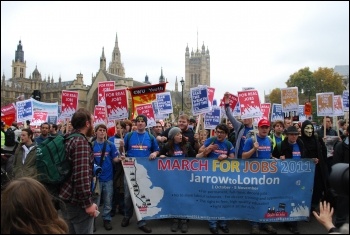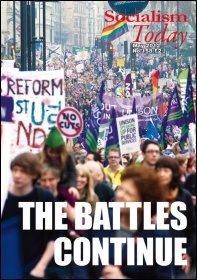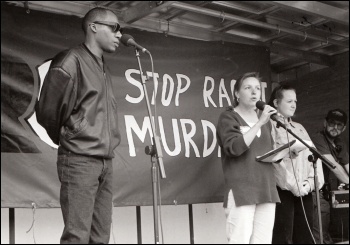Sam Buckley's book 'Banana Republic UK?' is a survey of vote-rigging, electoral fraud and error in British and Scottish elections since 2001. He concludes that a combination of practices in the electoral system have allowed for significant manipulation or error to take place, disenfranchising voters. “While we tolerate elections where votes are stolen, postmen robbed of ballot envelopes, voters pressured or threatened, where counts are impossible to verify, where ballot boxes are brought in with the seals hanging open, where non-existent people vote in their hundreds, where only the wealthy or the party machines can hope to bring election petitions and where thousands of ballots emerge from boxes that only hundreds were counted going into we are a servile people and our freedom hangs in the balance.” pg 163
Elections in Birmingham Bordesley Green and Aston wards in 2004 were referred to an election court with Mr Justice Mawrey concluding “I found there was reason to believe that corrupt practices extensively prevailed in the electoral areas of the relevant authority's area namely throughout the area of Birmingham City Council.” In Aston ward Labour activists were found in a warehouse either filling in hundreds of blank ballots or altering completed ones. It is common practice for any 'respected member of the community', including party activists to collect the postal votes in order to send them on to the election authority. Postal votes can also be stolen in a number of ways. For fraudsters this can allow a period of time to alter the ballot choices (there is no legal right to disregard a ballot which includes a vote that has been deleted, and replaced with one for another candidate), repackage them, and sent them on as valid votes.
Fraudulent postal applications in Birmingham led to hundreds of people turned away from polling stations on the election day. The sheer bulk of postal ballots and inadequate staffing meant that procedures established in 2001 for handling these votes were not followed, leaving no paper trail. The likelihood of human error was increased with insecurely stored ballots left unattended for long periods of time.
The government downplayed the issue, with Peter Hain, then Leader of the House of Commons, arguing that the proportion of votes involved in the fraud were trivial, however Sam Buckley comments these “...were in one ward, one of only two that were properly investigated – if they were projected across the nation (just a bit of fun) the equivalent figure would be more than two million two hundred thousand ballots... the party's real attitude is shown by the fact that none of the Labour activists and councillors involved were expelled from the Labour party...the message sent to vote riggers by parties that don't expel members for it is 'Don't get caught'.” pg. 39.
During the 2005 General Election Dominic Kennedy reporting in The Times said “There is obviously a terrible problem with intimidation. When I went to Yorkshire and the North West last June, I found people in vulnerable communities routinely forced to show their postal votes to bullies to prove who they voted for.” The Times 26/03/2005 quoted pg. 51. Reports of multiple ghost voters at derelict addresses and intimidation including threats to withdraw funding from a local youth service were made in Tower Hamlets where Respect's George Galloway was running against Labour incumbent MP Oona King. Craig Murray, ex-British ambassador to Uzbekistan, who ran against then Foreign Secretary Jack Straw in Blackburn to protest against the Iraq war, made complaints that Straw was treating community leaders to grand banquets to solicit votes! TheCPS did not pursue this crime (“...outlawed by the Great Reform Act of 1832 and gradually stamped out over the years until it had become unheard of. (Who says New Labour has no sense of history?)” pg. 54) because they regarded it as “trivial”!
Challenging an Election Result
Complaints over the conduct of an election can be brought to an election court. For council elections there is a deadline of 21 days after the election where at least 4 voters from the ward or the candidate can lodge a petition. The petitioners must provide the evidence and witnesses to the court and incur a total charge of £450 as well as £2,500 security deposit. On top of this there are legal costs and the possibility of being ordered to pay the costs of the defendant. These are costs per ward, so the overall burden can be significant.
The petitioner needs to demonstrate that the alleged breach of electoral law affected the outcome of the election; merely demonstrating that it took place is not enough. Ironically a complaint that voters were excluded from the electoral register will not be upheld as they are not considered voters in that area! Lastly legal aid – the scope of which is being further restricted by the present government - was refused in 2005 for an election petition brought by Respect. Challenging an election is something reserved for those with significant financial means, time and energy.
Electronic-Voting
In 2004 the Cabinet Office issued a briefing aiming to introduce electronic-voting some time after 2006. Electronic counting pilots took place in six councils in 2007. In South Buckinghamshire the equipment was provided by Election Systems and Software, a company whose 'votomatic' punch-card system is the US, Venezuela and Phillipines came under heavy criticism for the ease with which it could be manipulated. In three of the pilots the systems failed and had to be counted manually. Numerous errors were recorded, for instance the wrong party logo was displayed against a candidate's name. Also open computer ports were left in public areas, allowing for access to the system by anyone aiming to do so. E-counting in Dereham-Humbletoft ward in Norfolk, after being recounted manually, revealed that 56.1% of votes had been missed! There were also widespread issues of blemishes or marks on the ballot papers being picked up by scanners as votes or spoiled ballots. Issues with e-counting remain as it will be used for the GLA elections.
2006 and 2009 Reforms
The Electoral Administration Act 2006 made some changes to the system. Powers were introduced for voters to challenge a false registration as an elector after registration, as well as for Returning Officers to remove ineligible entries on the register (e.g. ghost voters), although this power is open to abuse. It also makes a criminal offence to apply for a postal vote on behalf of another individual without their knowledge or consent or to steal a postal vote. The time limit for criminal prosecution was extended but the application procedure to election courts remains unchanged. Additional safeguards were introduced for registration of voters, including, keeping parallel registration lists and signature and date of birth checks. Buckley comments “Unfortunately [these measures] leave gaps that vote riggers can throw a dog through.” pg.92
The theft of postal ballot papers as took place in Birmingham would not be affected by these changes. Likewise the safeguard measures to match personal identifiers only work if the first application is made by the voter and then is intercepted by a fraudster; if the fraduster makes the initial application or if he/she intercepts and alters it the details will match. Problems persist with the reliability of signature identification.
Further Cases
Since the EAA2006 came into force there have been examples of ballot-rigging in Slough by the registration of ghost voters. This was only discovered because of the incompetence of the (Tory) vote-riggers, “I have been appalled by the ease with which these substantial frauds were committed. The only reasons they came to light at all were the incompetence of the fraudsters and the blatant nature of the frauds.” Election Commissioner Mr Justice Mawrey quoted pg. 116
The Political Parties and Elections Act 2009 (which did not come into force until after the 2010 general election and its provisions are voluntary until 2015) made it a requirement when applying for the electoral registration to provide a national insurance number. Although this is not a complete guarantee due to identity theft, it will go some way towards cutting out ghost voters. The problem still remains that postal votes are not a guaranteed secret ballot and can be subject to manipulation, intimidation and pressures by family members, landlords, employers, party activists and so on.
The 2010 General Election suffered from apparent under-staffing at many polling stations, leading to long queues and many voters being turned away at 10pm after queueing for hours. There were accusations of ghost voters, late postal vote applications and registrations were high, and marginal seats saw a much higher demand for postal votes. According to Sam Buckley “...not more than one per cent of postal votes cast needed to be fraudulent to rig the whole election – just so long as they were in the right place.” pg. 148
Declining Turnout
Declining turnout at elections underlies this problem. This is only briefly considered in ‘Banana Republic UK?’, quoting Election Commissioner Mawrey (in Simmons v Khan 2008) “One can well see that, for professional politicians, the alternative rationale, namely that voters are disillusioned with politics and politicians and indifferent to their activities, is unthinkable.” As disillusionment with the pro-big business policies of New Labour steadily grew (and less than enthusiastic support emerged for the Tories) the government attempted to boost participation through the use of postal voting. Alongside the timidity of much of the trade union leadership the absence of a workers party has allowed a vacuum for genuine working-class political representation and debate to form in Britain.

It is not enough to simply try and perfect the electoral system. Many hurdles are thrown up before working-class people under the present electoral system. Standing candidates with all the imbalance of time, money and media exposure, is a very hard thing to do. The electoral system has opened up the possibility of significant fraud and mistakes taking place. The hypocrisy is blinding, as Buckley comments in 2009 a court injunction prevented British Airways staff from striking due to minor ballot irregularities, “...if governments and local authorities were held to the same standard as trades unions it is unlikely that any election would ever be declared valid.” pg. 118.
Sam Buckley's recommendations to end postal voting on demand and all forms of remote voting, to end e-counting and reform election petition applications make a lot of sense. Other measures spring to mind, such as properly staffed counts, with decent breaks and a longer counting period to avoid human error. Likewise, making elections a public holiday, and holding them over a number of days, would probably increase voter turnout. However these recommendations, if implemented would simply make a bad situation a little less bad. Without a party of the working-class, where strategy and tactics can be debated on a mass and minute scale, and decisions can be put into practice, many people will continue to be disillusioned by the British electoral system. The failures of the mechanics of that system will only intensify that dissatisfaction.
In fact, attempts to reform the system, without addressing this underlying problem, could lead to a strengthening of the main capitalist parties. The Tories have recently proposed bringing forward existing plans to shift voter registration from households to individuals. This would require individuals to register themselves and provide a date of birth and National Insurance number to be checked by the Department for Work and Pensions. This would reduce the possibility of ghost voters. However it will have the effect of reducing voter registration by an estimated 10million mainly in inner city areas. The problems of the present system mean that it cannot be defended. However solving the problem lies elsewhere, in the lack of a party worth voting for. Attempts at reform, while on the face of it correct, will rebound in another way, strengthening the traditionally Tory areas over more deprived inner cities and disenfranchising a whole layer.
However the existence of such a new workers party would not in and of itself end these problems. Under capitalism the working-class and poor are largely excluded from any democratic control over the economy. These decisions are taken instead according to the blind forces of the profit-driven market system. We only participate in decisions concerning production as consumers, although this reflects the wages employers are willing to pay us much more than it reflects our wants and needs. Until democratic workers control and management is held over the workings the economy, by replacing the capitalist system with a socialist one, we will not be able to speak genuinely about a democratic system in Britain or anywhere.







